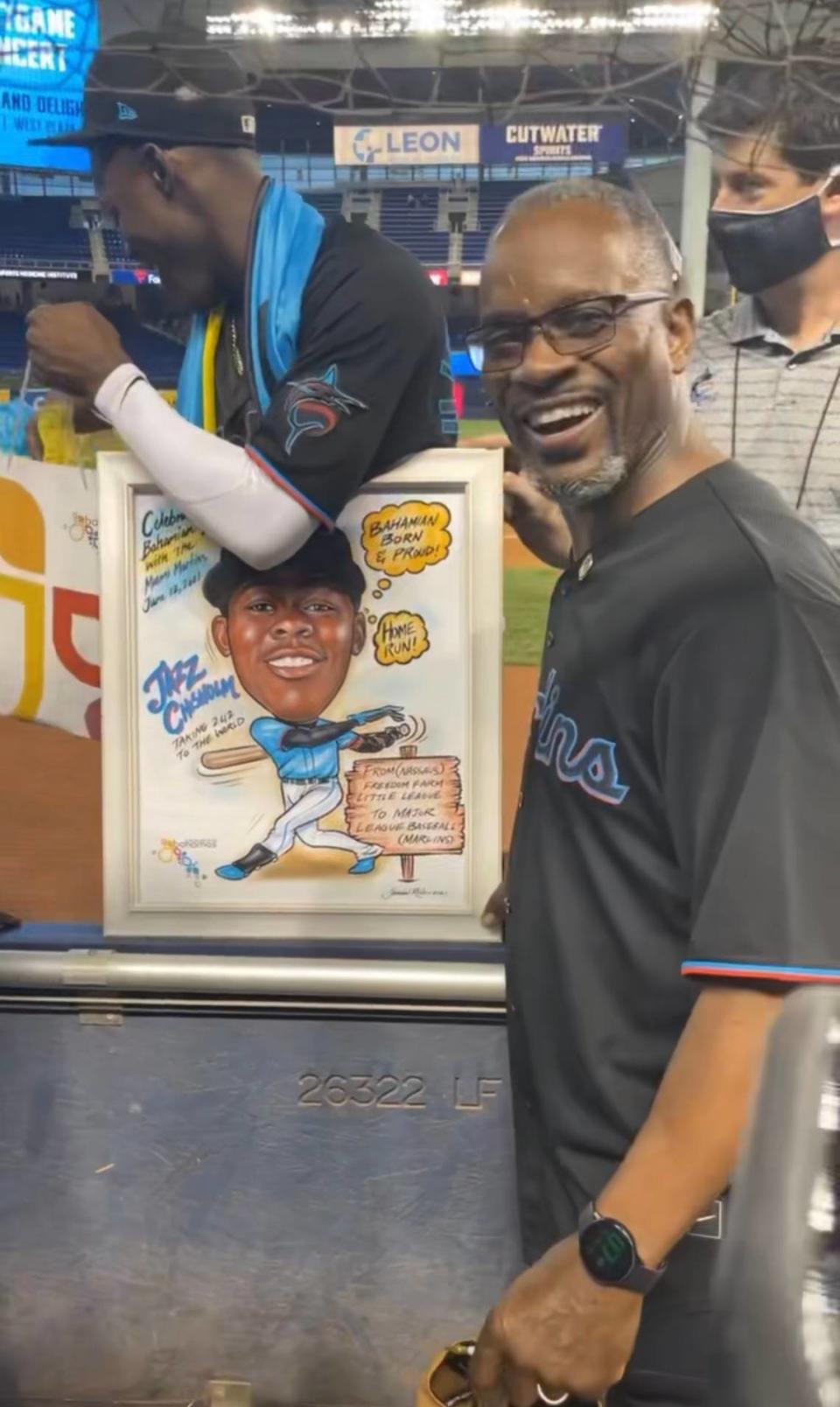Marlins celebrate Bahamian culture. Why not? It’s Caribbean-American Heritage Month
The Miami Marlins joined the nation in celebrating Bahamian culture as part of Caribbean-American Heritage Month at Saturday’s game.
Before the Marlins faced the Atlanta Braves at IoanDepot Park, the Bahamas Junkanoo Revue paraded through the stadium in festive clothing with a band in tow playing music using drums, cowbells, whistles and brass instruments.
Beacon For Change and the Marlins partnered together to bring the culture experience to the stadium.
Bahamas Junkanoo Revue, the group based in South Florida, practices junkanoo, a Bahamian parade tradition that occurs on Boxing Day and New Year’s Day, according to the HistoryMiami Museum. They perform year-round in handmade clothing.
Bahamas Minister of Youth, Sports and Culture Iram Lewis was also at the game and presented a caricature painting to shortstop Jasrado “Jazz” Prince Hermis Arrington Chisholm Jr., a star rookie for the Marlins.
Lewis and his fellow Bahamians are celebrating Chisholm, hoping that he, a Bahamian, serves as an inspiration for the country’s youth and shows “how you can make it in life if you’re disciplined.”
“Jazz has shown that he works hard; he is very well mannered. He’s disciplined,” Lewis said. “As long as he stays healthy, he’s going to be a superstar.”

Lewis was planned to throw out the first pitch of the game, but couldn’t due to COVID-19 restrictions. Bahamian Prime Minister Hubert Minnis and others also hoped to be in town, but Minnis couldn’t make it, Lewis said.
Lewis isn’t just a member of the Bahamas Parliament who led the country’s recovery after Hurricane Dorian devastated Abaco and Grand Bahama on Sept. 1, 2019. He’s also a former athlete: He was a member of the Bahamas’ 4 X 100m relay team in the 1996 Summer Olympics and the 2000 Summer Olympics.
“They didn’t have do do this,” Lewis said about Miami-Dade County, which made the celebration happen along with the Marlins. “But of course they are doing it and they are celebrating the Bahamian heritage.”
Bahamian roots run deep from Key West to Palm Beach. Their arrival dates back to the early 1900s, when settlers came to work on the railroad being built by Henry Flagler and also flower farms. They in turn built communities including churches, houses and businesses.
“A lot of Bahamians live right in South Florida and were involved in the construction of [Coconut] Grove and Key West, so the Bahamian diaspora is spread wide and far,’ Lewis said.
Lewis is hoping that spotlighting the country’s culture will encourage people to learn more about the Bahamas and visit.
“The Bahamas is wide open,” he said with a chuckle. “I am happy to say that I came through Nassau and the airport was swarming with people. It was the most tourists I’d seen in a very long time. We have an upswing right now and it’s doing well for the economy.”
Like all tourism-dependent Caribbean islands, the Bahamas’ economy has during the COVID-19 pandemic. On several occasions, the government was forced to close the country’s border to tourists.
In the hopes of luring tourists back, the government recently allowed cruise ships into port. On Saturday, Royal Caribbean International’s Adventure of the Seas launched cruises from Nassau, and the Crystal Serenity plans to offer Bahamas-only itineraries from Nassau as of July 3.
The home porting, Lewis said, will do “very well for our economy, Grand Bahama in particular.” The Bahamas, he said was taking travel protocols seriously. Two passengers on a Celebrity Millennium ship that left from St. Maarten in the Dutch Antilles recently tested positive for COVID-19. Most of the ship’s passengers and crew were vaccinated.
“No matter where you go you’re going to have outbreaks. You just have to work with it as best as you can,” he said, emphasizing that the Bahamas is still insisting on social distancing and other COVID-19 protocols.
Saturday’s appearance at the Marlins game was a welcomed break for the minister from Dorian recovery. The storm caused $3.4 billion worth of damage to the Bahamas, according to a study by the Inter-American Development Bank. Some 29,500 people were left homeless or without jobs — or both. The official death toll at the time was around 67, though the report acknowledged that 282 people were still missing as of late October 2019.
Among the projects Lewis oversaw: a small home repair program, which allowed Dorian’s victims to access up to $10,000 in funds for repair. Rebuilt hurricane shelters and school repairs were also a priority.
Though no longer in charge of the reconstruction and recovery, he said, a new budget is in the works for July 1, and additional funds are being allocated for reconstruction related to Dorian’s devastation.
“As it stand now, most of our hurricane shelters are up to speed and ready to open,” said Lewis.
With a new hurricane season already under way, Lewis said he believes the Bahamas today “is more prepared than ever.”
“Yeah there is still some rebuilding to do, some work to do; it’s going to take a while ... but we are doing our best under the circumstance,” he said. “Our economy got hit so hard. So we are doing the best that we can with what we have.”

